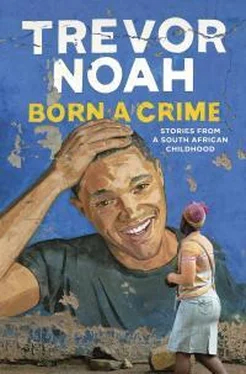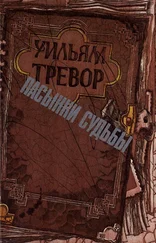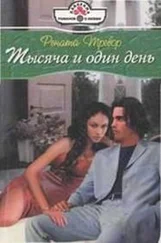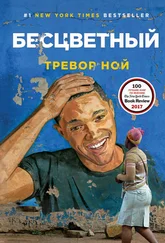In Soweto, religion filled the void left by absent men. I used to ask my mom if it was hard for her to raise me alone without a husband. She’d reply, “Just because I live without a man doesn’t mean I’ve never had a husband. God is my husband.” For my mom, my aunt, my grandmother, and all the other women on our street, life centered on faith. Prayer meetings would rotate houses up and down the block based on the day. These groups were women and children only. My mom would always ask my uncle Velile to join, and he’d say, “I would join if there were more men, but I can’t be the only one here.” Then the singing and praying would start, and that was his cue to leave.
For these prayer meetings, we’d jam ourselves into the tiny living area of the host family’s house and form a circle. Then we would go around the circle offering prayers. The grannies would talk about what was happening in their lives. “I’m happy to be here. I had a good week at work. I got a raise and I wanted to say thank you and praise Jesus.” Sometimes they’d pull out their Bible and say, “This scripture spoke to me and maybe it will help you.” Then there would be a bit of song. There was a leather pad called “the beat” that you’d strap to your palm, like a percussion instrument. Someone would clap along on that, keeping time while everyone sang, “Masango vulekani singene eJerusalema . Masango vulekani singene eJerusalema . ”
That’s how it would go. Pray, sing, pray. Sing, pray, sing. Sing, sing, sing. Pray, pray, pray. Sometimes it would last for hours, always ending with an “amen,” and they could keep that “amen” going on for five minutes at least. “Ah-men. Ah-ah-ah-men. Ah-ah-ah-ah-men. Ahhhhhhhhahhhhhhhhhhhahhhhhahhhhhhahhhhhmen. Meni-meni-meni. Men-men-men. Ahhhhhhhhhhhhhhhhhhhhhhhhhhhhhhhhhhhhhhhhhhhhmmmmmmmennnnnnnnnnnnnnnnnnnnnnnnnnnnnnnnnnnnnnnnnnnnnnnnnnnnnnnnnnnnnnnnnnnnnnnnnnnnnnnnnnnnnnnnnnnnnnnnnnnnnnnnnnnnnnnnnnnnnnnnnnnnnnnnnnnnnnnn.” Then everyone would say goodbye and go home. Next night, different house, same thing.
Tuesday nights, the prayer meeting came to my grandmother’s house, and I was always excited, for two reasons. One, I got to clap along on the beat for the singing. And two, I loved to pray. My grandmother always told me that she loved my prayers. She believed my prayers were more powerful, because I prayed in English. Everyone knows that Jesus, who’s white, speaks English. The Bible is in English. Yes, the Bible was not written in English, but the Bible came to South Africa in English so to us it’s in English. Which made my prayers the best prayers because English prayers get answered first. How do we know this? Look at white people. Clearly they’re getting through to the right person. Add to that Matthew 19:14. “Suffer little children to come unto me,” Jesus said, “for theirs is the kingdom of heaven.” So if a child is praying in English? To White Jesus? That’s a powerful combination right there. Whenever I prayed, my grandmother would say, “That prayer is going to get answered. I can feel it.”
Women in the township always had something to pray for—money problems, a son who’d been arrested, a daughter who was sick, a husband who drank. Whenever the prayer meetings were at our house, because my prayers were so good, my grandmother would want me to pray for everyone. She would turn to me and say, “Trevor, pray.” And I’d pray. I loved doing it. My grandmother had convinced me that my prayers got answered. I felt like I was helping people.
—
There is something magical about Soweto. Yes, it was a prison designed by our oppressors, but it also gave us a sense of self-determination and control. Soweto was ours. It had an aspirational quality that you don’t find elsewhere. In America the dream is to make it out of the ghetto. In Soweto, because there was no leaving the ghetto, the dream was to transform the ghetto.
For the million people who lived in Soweto, there were no stores, no bars, no restaurants. There were no paved roads, minimal electricity, inadequate sewerage. But when you put one million people together in one place, they find a way to make a life for themselves. A black-market economy rose up, with every type of business being run out of someone’s house: auto mechanics, day care, guys selling refurbished tires.
The most common were the spaza shops and the shebeens. The spaza shops were informal grocery stores. People would build a kiosk in their garage, buy wholesale bread and eggs, and then resell them piecemeal. Everyone in the township bought things in minute quantities because nobody had any money. You couldn’t afford to buy a dozen eggs at a time, but you could buy two eggs because that’s all you needed that morning. You could buy a quarter loaf of bread, a cup of sugar. The shebeens were unlawful bars in the back of someone’s house. They’d put chairs in their backyard and hang out an awning and run a speakeasy. The shebeens were where men would go to drink after work and during prayer meetings and most any other time of day as well.
People built homes the way they bought eggs: a little at a time. Every family in the township was allocated a piece of land by the government. You’d first build a shanty on your plot, a makeshift structure of plywood and corrugated iron. Over time, you’d save up money and build a brick wall. One wall. Then you’d save up and build another wall. Then, years later, a third wall and eventually a fourth. Now you had a room, one room for everyone in your family to sleep, eat, do everything. Then you’d save up for a roof. Then windows. Then you’d plaster the thing. Then your daughter would start a family. There was nowhere for them to go, so they’d move in with you. You’d add another corrugated-iron structure onto your brick room and slowly, over years, turn that into a proper room for them as well. Now your house had two rooms. Then three. Maybe four. Slowly, over generations, you’d keep trying to get to the point where you had a home.
My grandmother lived in Orlando East. She had a two-room house. Not a two-bedroom house. A two-room house. There was a bedroom, and then there was basically a living room/kitchen/everything-else room. Some might say we lived like poor people. I prefer “open plan.” My mom and I would stay there during school holidays. My aunt and cousins would be there whenever she was on the outs with Dinky. We all slept on the floor in one room, my mom and me, my aunt and my cousins, my uncle and my grandmother and my great-grandmother. The adults each had their own foam mattresses, and there was one big one that we’d roll out into the middle, and the kids slept on that.
We had two shanties in the backyard that my grandmother would rent out to migrants and seasonal workers. We had a small peach tree in a tiny patch on one side of the house and on the other side my grandmother had a driveway. I never understood why my grandmother had a driveway. She didn’t have a car. She didn’t know how to drive. Yet she had a driveway. All of our neighbors had driveways, some with fancy, cast-iron gates. None of them had cars, either. There was no future in which most of these families would ever have cars. There was maybe one car for every thousand people, yet almost everyone had a driveway. It was almost like building the driveway was a way of willing the car to happen. The story of Soweto is the story of the driveways. It’s a hopeful place.
—
Sadly, no matter how fancy you made your house, there was one thing you could never aspire to improve: your toilet. There was no indoor running water, just one communal outdoor tap and one outdoor toilet shared by six or seven houses. Our toilet was in a corrugated-iron outhouse shared among the adjoining houses. Inside, there was a concrete slab with a hole in it and a plastic toilet seat on top; there had been a lid at some point, but it had broken and disappeared long ago. We couldn’t afford toilet paper, so on the wall next to the seat was a wire hanger with old newspaper on it for you to wipe. The newspaper was uncomfortable, but at least I stayed informed while I handled my business.
Читать дальше










